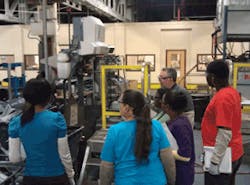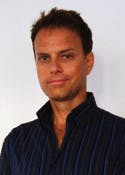EHS professionals are stretched thin, expected to do more with less year after year. But what if you could build a low-cost program to channel the energy of managers and employees across your company to advance EHS priorities? Ingersoll Rand's One STEP Forward program does just that – enlisting employees across the company to view their personal lives and their workplace through a sustainability lens, and to lead sustainability projects with positive EHS impacts.
See Also: Occupational Health & Safety (OHS) Training
Employee reaction to the program has been overwhelmingly positive. Since launching in early 2012, the program has created more than 300 new Sustainability Champions who generated nearly 500 sustainability project ideas across 14 sites in four countries, all to help the company improve both its business and EHS and sustainability performance.
Driving Sustainability
Part of Ingersoll Rand's mission includes helping clients increase energy efficiency and reduce related greenhouse gas emissions. The company has established aggressive operational sustainability goals that must engage all parts of the organization, not just manufacturing and EHS.
To help meet these goals, the Ingersoll Rand Center for Energy Efficiency and Sustainability (CEES) created an internal sustainability "engine," the One STEP Forward program, which aims to educate, engage and empower the corporation's 52,000 employees around the world to lead projects that deliver positive EHS and sustainability impacts. No one knows the company's systems, requirements and idiosyncrasies better than the workers on the ground, so no one is better equipped to drive sustainability into the heart of the organization.
CEES Director of Global Education Initiatives Gretchen Digby explains the need that sparked the program's development: "Creating high employee engagement and developing a sustainable culture are two pillars of Ingersoll Rand's business strategy. We had volunteer networks focused on sustainability scattered across the company but many employees were unable to participate in these programs for various reasons. To help close the gap and leverage their desire to contribute, we built the One STEP Forward program."
One STEP Forward is a long-term, company-wide employee engagement program launched with onsite sustainability champion training and reinforced by the site-level execution of sustainability projects. Sustainability champions are leaders who learn intensively about sustainability and its relevance to the business and who are asked to carry sustainability into the organization by modeling more sustainable choices, leading sustainability projects and enrolling others to participate.
Program participants either volunteer or are nominated by managers. Ideal sustainability champions candidates are passionate about sustainability, interested in new leadership opportunities and respected by their managers and peers. To maximize diversity and long-term buy-in, the group includes a broad cross-section of employees representing various functions and all levels of responsibility, from site leaders – including each facility manager and EHS manager – to administrative personnel and workers on the floor.
How It Works
Designing a successful program to advance sustainability required overcoming a significant conceptual hurdle. To most employees outside EHS, the term sustainability sounds like "someone else's job." And key sustainability issues – resource degradation, population growth, human rights, species extinction, pollution, climate change – seem vast, abstract and disconnected from most employees' day-to-day work. Yet CEES leaders wanted to teach employees about these issues because they create real impacts on the business.
To make these topics relevant, accessible and manageable, the program delves into a subset of sustainability challenges – including the business and human health impacts of pollution, waste generation and resource availability – and emphasizes their long-term and collective nature. Program participants see that problems created by many people over time will not be solved overnight, but this does not reduce anyone's responsibility or power to act. The program effectively engages employees to realize: "We cannot solve these problems alone, and we cannot solve them completely today, but what human hands have done, human hands can undo. Every one of us, at every level, can contribute to a solution by taking One STEP Forward."
After awakening employees from various functions to these key EHS and sustainability issues, the program invites them to connect sustainability to their own personal values – including family, friends, religion, community, etc. This approach is key because it avoids politics and ideology, allowing each participant to engage the concepts in a way that is consistent with the way they see the world rather than imposing an outside vision of why sustainability matters.
Only after participants have made their own connections do they learn how Ingersoll Rand views sustainability and what public EHS commitments the company already has made. Site-level EHS managers follow this up – and again, emphasize the homegrown aspect of the program – by presenting local facts and figures. After the group works through a sustainable design exercise to flex their creativity and expand their collective thinking about what is possible, teams walk through the site to find challenges and opportunities in their own workplaces. Finally, the employees propose and outline real projects that will both improve EHS and sustainability outcomes and deliver business value. Upon completing all these steps, the employees become company sustainability champions.
Digby describes the profound change triggered in the champions: "They walk away from the champion orientation thinking, ‘I can actually do something.' And they'll commit to a small individual action of their choosing – what we call a STEP – which we later connect to bigger, work-related projects. When we talk about what sustainability means to Ingersoll Rand as a company, from there it's a short leap for people to tie it to their professional goals."
When the workshop concludes, work on sustainability projects begins. Managed and funded at the site level, sustainability projects bring together champions from all functions who share interest in the project and/or relevant expertise. Employees are challenged to stretch beyond their standard job responsibilities, and many projects end up advancing EHS objectives.
Projects vary from site to site but common focus areas include: assessing lighting for potential upgrades; improving signage for material handling and waste management; amelioration of safety hazards; improvement of HVAC performance; and evaluation of air and energy flows within and beyond the building envelope. There also are projects unique to particular facilities, including waste heat recovery, fluid recycling/reuse, water reclamation, local ecosystem restoration, community education and engagement of customers and suppliers to enhance overall sustainability outcomes.
The Impact of Sustainability
How does One STEP Forward improve the organization's EHS and sustainability performance? Profound shifts in attitude mark a growth in awareness and responsibility for sustainability within Ingersoll Rand.
"At a minimum," Digby explains, "our champions feel they have a license to speak up and identify a sustainability opportunity or a waste reduction opportunity. And everyone in the program commits to support a specific sustainability improvement project, so they take it well beyond that."
All this education and all these projects support EHS professionals in reaching their goals. And the ultimate goal of One STEP Forward is to weave sustainability into the company culture. "The ideal," Digby says, "would be that someone on the factory floor sees someone else doing something unsustainable and they walk up and say, ‘Hey, that's not the way we do things here. That's not sustainable. Here's the more sustainable way to do it.' Over the long term, sustainability should be as important a cultural element as safety, ethics, diversity and quality."
Judging from the reaction of site-level EHS managers, the program has made a good start in that direction.
"We feel like we're preaching to the choir a lot," says one manager, "But now I feel people are engaged to help get something done. [This is helping employees across the company] get passionate and start to spread the word. Then it will create a domino effect."
Another testifies, "I'm not fond of meetings, but this program brought out lots of ideas from lots of different people I'd never thought about talking to. Now I know EHS is no longer an island within the facility. Shared ownership is so important for us to reach our EHS goals. Safety is not just one person's job; it should be everyone's job. It's the same with sustainability."


